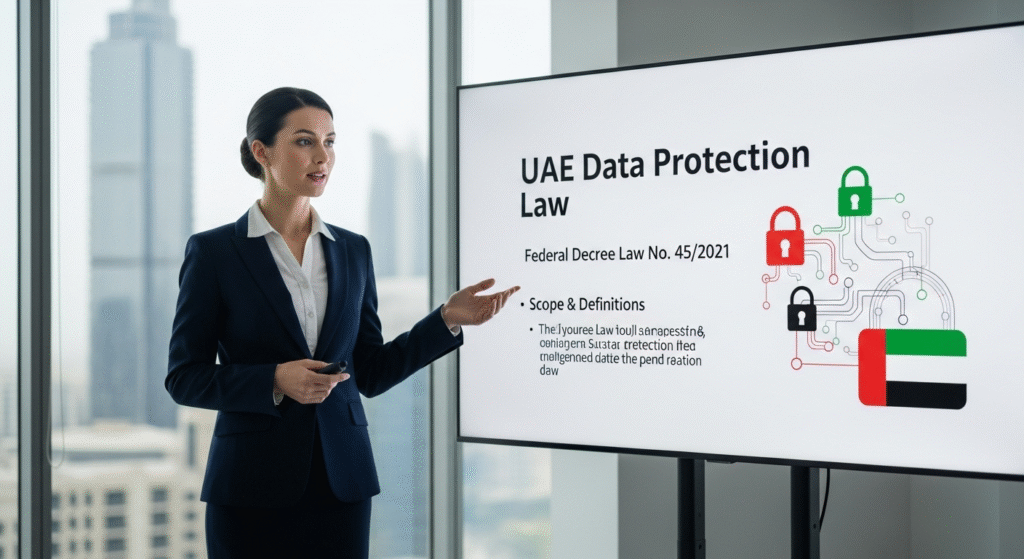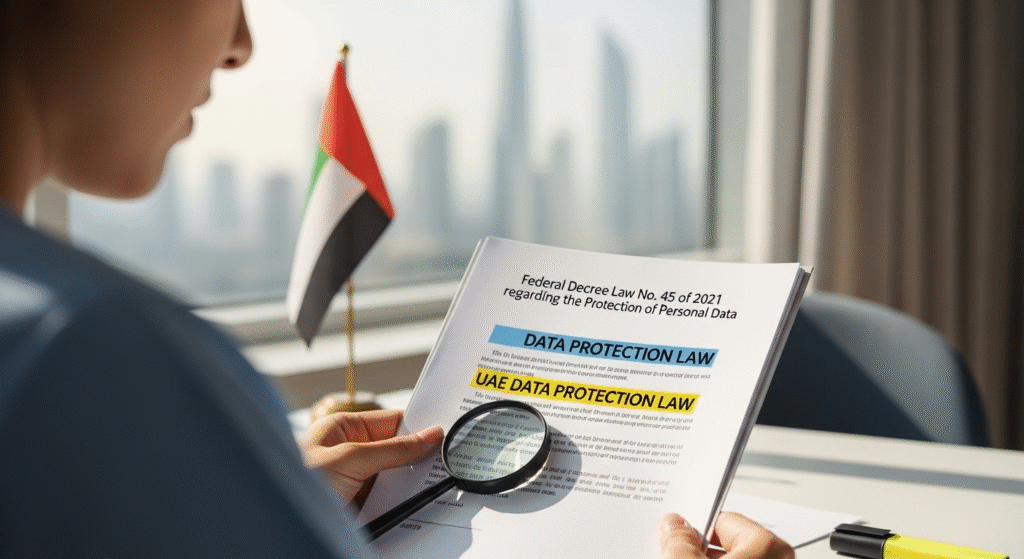In today’s digital world, information travels faster than ever. Every click, purchase, and form submission creates data — data that businesses collect, store, and use daily. But with opportunity comes responsibility. Across the UAE, companies are realizing that compliance with the data protection law and broader privacy regulations are not optional extras. They’re vital to customer trust and long-term success.
The UAE Data Protection Law (Federal Decree-Law No. 45 of 2021 on the Protection of Personal Data) has reshaped how organizations manage personal information. As we move through 2025, compliance is not just about avoiding fines; it’s about building integrity, trust, and confidence in your business operations.
What Every UAE Business Should Know About Data Privacy in 2025

Why Data Privacy Matters More Than Ever
Consumers in the UAE are more aware than ever of how their personal information is used. They expect transparency, consent, and security. A single data breach can damage years of brand reputation and customer loyalty. According to PwC’s Global Consumer Intelligence Series on customer trust, 85% of consumers worldwide say they will not do business with a company if they have concerns about its data security practices (PwC, 2023).
The UAE government introduced the Data Protection Law to align with global standards such as the EU’s General Data Protection Regulation (GDPR) while addressing local business realities. The law establishes clear rights for individuals and strict obligations for organizations. It also reflects the nation’s broader vision to become a global leader in digital transformation and ethical data governance.
The Evolving Privacy Landscape in the UAE
Compliance obligations in the UAE vary depending on where your business operates:
| Regulation / Framework | Jurisdiction / Coverage | Key Highlights |
| Federal Data Protection Law (Federal Decree-Law No. 45 of 2021) | Applies to all onshore entities in the UAE (outside free zones) | Establishes national standards for processing, storing, and transferring personal data; overseen by the UAE Data Office. |
| DIFC Data Protection Law No. 5 of 2020 | Applies within the Dubai International Financial Centre (DIFC) | Aligns closely with GDPR principles; includes provisions on consent, accountability, and data transfer adequacy. |
| ADGM Data Protection Regulations 2021 | Applies within the Abu Dhabi Global Market (ADGM) | Provides a comprehensive framework for lawful processing, data subject rights, and regulatory enforcement within ADGM. |
| Sector-Specific Regulations | Applies to regulated industries such as finance, healthcare, telecommunications, and government services | Mandate additional controls for handling sensitive or confidential data, often under respective authorities (e.g., Central Bank, DHA, TDRA). |
Understanding which framework applies to your organization is the first step in protecting your business and customers. Many UAE companies begin by mapping how they collect, process, and transfer personal data — often revealing hidden risks or outdated practices.
Understanding the UAE Data Protection Law and Its Business Impact

Key Principles Every Business Must Follow
The law is built on universal principles that promote responsible data management:
| Principle | Description |
| Lawfulness and Fairness | Data must be collected and processed for legitimate, clearly defined purposes that comply with the law. |
| Transparency | Individuals must be informed about how and why their personal data is collected, processed, and stored. |
| Purpose Limitation | Personal data may only be used for the specific purpose for which it was originally collected. |
| Accuracy and Security | Data must remain accurate, up to date, and safeguarded against unauthorized access, loss, or misuse. |
| Accountability | Organizations are responsible for demonstrating continuous compliance with the UAE Data Protection Law and related regulations. |
These principles form the backbone of ethical data handling and strengthen both legal compliance and brand reputation.
How the Law Affects Everyday Business Operations
Every department — from marketing to HR — is affected by the UAE Data Protection Law.
- Human Resources: HR teams must collect employee information lawfully and ensure it’s stored securely.
- Marketing: Consent is required before using customer data for promotions or analytics.
- IT and Cybersecurity: Systems must have technical safeguards to prevent unauthorized access or data breaches.
For companies that move data across borders — for example, using international cloud providers — the law introduces rules for cross-border data transfers. Personal data can only be sent to jurisdictions with adequate protection or under approved contractual safeguards (UAE Digital Government, 2023).
Common Challenges for UAE Businesses

While the law is clear, implementation can be complex. Common challenges include:
- Lack of a complete data inventory
- Weak consent or privacy-notice processes
- Insufficient employee awareness
- Outdated or unsecured digital systems
- Unclear accountability between controllers and processors
These gaps often surface during internal audits or external reviews. The good news: most issues can be fixed through structured compliance programs that include training, documentation, and monitoring.
Turning Compliance Into Opportunity
Forward-thinking companies view compliance not as an expense but as a strategic asset. By aligning with the UAE Data Protection Law, they:
- Earn customer trust through transparent and responsible data practices
- Streamline internal workflows via strong governance structures
- Reduce long-term legal and reputational risks
- Gain a competitive edge when bidding for contracts that require privacy certification
According to IBM’s Cost of a Data Breach Report 2023, organizations with fully deployed security automation and incident response planning reduced average breach costs by up to USD 1.76 million compared to those without such measures (IBM Security, 2023).. Compliance, in other words, pays off.
Our Compliance Services: Full Support to Meet UAE Data Protection Law Requirements

Comprehensive Support for Your Compliance Journey
At MCompliance, we understand that every organization’s compliance journey is unique. With years of collective experience in regulatory advisory, our experts help UAE businesses build, implement, and maintain privacy programs that meet legal and operational needs.
Our services include:
| Service | Description |
| Gap Assessments | Identify where your organization’s current data protection practices fall short of UAE legal and regulatory standards. |
| Implementation Roadmaps | Develop practical, step-by-step action plans to achieve full compliance with the UAE Data Protection Law. |
| Policy Development | Draft and implement privacy policies, consent forms, and internal data-handling procedures tailored to your business operations. |
| Training and Awareness | Equip your teams with hands-on knowledge and best practices to ensure compliance is maintained day-to-day. |
| Ongoing Monitoring | Continuously track regulatory updates and adapt your compliance framework to meet evolving legal requirements. |
Each engagement is guided by proven methodologies aligned with ISO 27001, GDPR, and regional frameworks, ensuring your business remains protected and future-ready.
Why Partner with MCompliance
Businesses across the GCC trust MCompliance for one simple reason — we combine technical expertise with deep local insight.
Our specialists:
- Have hands-on experience with federal and free-zone data protection regimes
- Provide practical, actionable advice tailored to UAE operations
- Maintain long-term relationships with clients through continuous support and regulatory updates
With MCompliance, compliance is more than a checklist — it becomes part of your organization’s culture of trust and responsibility.
Take the Next Step: Request a Compliance Assessment
Compliance is a journey, not a one-time project. Begin that journey with a trusted partner who understands both the letter and spirit of the law.
Book a Free Initial Compliance Assessment
Our experts will review your current data-handling practices, identify risks, and outline a clear roadmap toward full compliance with the UAE Data Protection Law.
Get Your UAE Data Protection Compliance Assessment Today
Visit MCompliance.ae to schedule your consultation and protect your business, customers, and reputation.
FAQs About the UAE Data Protection Law
Q1. Who must comply with the UAE Data Protection Law?
All UAE-based organizations — whether private or public — that process personal data of individuals within the UAE must comply.
Q2. What are the penalties for non-compliance?
Penalties can include financial fines and regulatory sanctions, depending on the severity and frequency of violations.
Q3. How does the UAE law differ from the EU GDPR?
While similar in principle, the UAE framework offers flexibility for local businesses and considers the country’s mixed jurisdictional environment.
Q4. How can MCompliance help?
We offer audits, advisory, and implementation services designed to help you meet all requirements efficiently and confidently.
Final Thoughts
Data privacy is more than a regulatory demand — it’s the foundation of modern business ethics. By embracing the UAE Data Protection Law, organizations signal to their customers, partners, and employees that they value integrity, security, and trust.
With expert guidance from MCompliance, you can turn compliance into a competitive advantage and build a safer, more transparent future for your organization.
Contact MCompliance today to begin your journey toward full compliance with the UAE Data Protection Law.
For additional details on Regulatory Compliance, please refer to these links.
- The Impact of Weak Internal Controls on Business Reputation
- Why Financial Crime Compliance Is More Critical Than Ever in 2025
- What is KYC and Why It Matters for Businesses in the UAE
- Understanding the DIFC Data Protection Landscape and Why It Matters
- Understanding KYC & AML: Risk Assessment Steps That Safeguard Your Business




